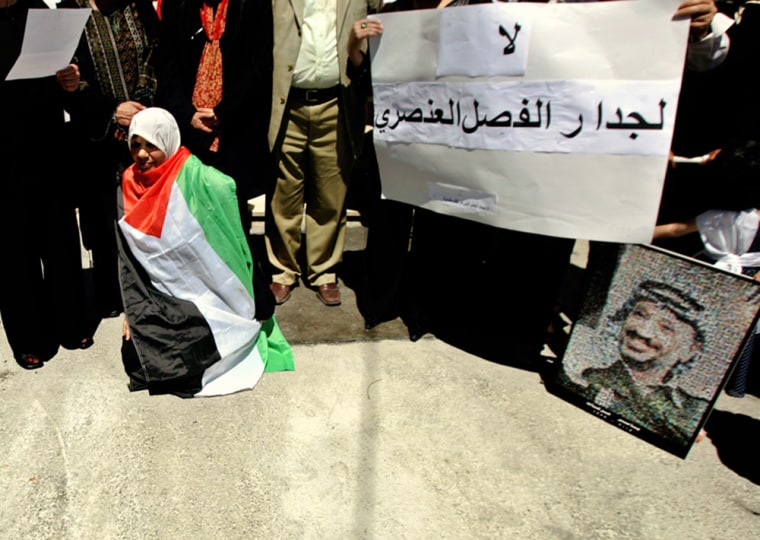Senior Palestinian militants imprisoned in Israeli jails hammered out a proposal softening Hamas’ rejection of Israel’s right to exist in what could be a first step toward moderation for the Islamic militant group, Palestinian officials said Thursday.
The proposal, accepting a Palestinian state alongside Israel, was signed by a well-known Hamas militant, but it’s far from clear if it will be accepted by the group’s hard-line leaders abroad, who have resisted international demands to recognize Israel and renounce violence. Hamas officials in Damascus had no immediate comment.
Since Hamas won Jan. 25 parliamentary elections, the Palestinian government has grown increasingly isolated. Western nations, which list Hamas as a terror group, cut off all funding to the Palestinian Authority, and the Israeli government froze monthly transfer of $55 million it collects in taxes for the Palestinians.
The economic boycott has left the Palestinian government unable to pay salaries to its 165,000 workers, causing a deepening financial crisis throughout the West Bank and Gaza.
Stocks of fuel dwindled in recent days and many gas pumps ran dry after Dor Energy, the Israeli company that provides all fuel to the Palestinian territories, cut off supplies Wednesday, citing the Palestinian government’s heavy debts.
But Palestinian President Mahmoud Abbas authorized the release of money to pay the debts, said Mohammed Mustafa, the head of the Palestinian Investment Fund. Israel’s Channel 10 TV reported late Thursday that fuel shipments had resumed.
The apparent resolution came just days after Western officials, fearing a humanitarian catastrophe in Palestinian towns, agreed to restore some aid to the Palestinians, as long as it was not handled by Hamas. Israeli officials also said they would consider releasing some of the withheld taxes to meet the Palestinians’ humanitarian needs, but only if it bypassed Hamas.
Washington approves
In Washington, State Department official Sean McCormack praised the Israeli decision. “Without knowing the details, I think that the initial reaction would be this is a good, positive step in addressing the humanitarian situation of the Palestinian people,” he said.
Since Hamas formed a Cabinet in March, the group’s leaders have been searching for a way to end their government’s international isolation. Hamas leaders in Gaza and the West Bank have hinted they might abandon the group’s call for the destruction of Israel, but Khaled Mashaal, the Syria-based leader of Hamas, has rejected any suggestion of moderation.
The draft agreement was negotiated over the past month by militants held in Hadarim Prison next to the seaside Israeli city of Netanya, including Marwan Barghouti, a leader of Abbas’ Fatah Party, and Abdel Khaled Natche, the top Hamas militant held by Israel.
The proposal calls for the establishment of a Palestinian state “in all the lands occupied in 1967,” a reference to the West Bank, Gaza Strip and east Jerusalem. The document does not include explicit recognition of Israel, but even the implied recognition would mark a major breakthrough for Hamas.
Mushir al-Masri, a Gaza-based Hamas spokesman, praised the prisoners’ effort but refused to commit to the agreement. “It could be a good base for a national platform and a national dialogue, but it still needs more discussion,” he said Thursday.
Abbas on board
Abbas said he backs the draft, which also authorizes him to lead peace talks with Israel based on what is referred to as “Arab legitimacy,” an apparent reference to an Arab peace initiative that calls for a two-state solution. “This document is very important,” Abbas said. “It includes a deep and realistic political vision that to a very large extent represents my point of view ... and thus I adopt it.”
Israeli Prime Minister Ehud Olmert has said he is ready to withdraw from much of the West Bank to make way for an independent Palestinian state, but he plans to keep large blocs of West Bank settlements and holy sites in east Jerusalem.
Israeli Foreign Ministry spokesman Mark Regev declined to comment on the accord, calling it an internal Palestinian matter.
The draft agreement does not renounce violence, saying Palestinians should “focus their resistance on the lands occupied in 1967.”
Hamas has largely observed a truce since February 2005 but has refused to renounce violence formally. Barghouti has supported continued shooting and bombing attacks against Israelis in the West Bank and Gaza, while Abbas opposes all violence.
Talks meant to end tension
The prison negotiations were also aimed at ending tension between Hamas and Fatah, who are vying for control of the government. The rivalry erupted into violence in Gaza this week, killing three people and wounding more than a dozen.
Hamas and Fatah are to hold crucial talks in two weeks to try to settle their differences, and the draft, which calls for Fatah to join the Hamas government, could be part of the negotiations.
Also Thursday, Israel’s dovish new defense minister, Amir Peretz, met with his top generals and told them he was considering easing restrictions on exports from Gaza to Israel.
Israel has kept the main Karni cargo crossing closed for much of the year. The Israeli military cites security concerns, but Palestinians say they are being penalized for electing Hamas.
Outside U.N. headquarters in Gaza City, about 40 children set up a tent to protest what they called an economic siege. Several stripped to their underwear and stood on U.S. and Israeli flags to dramatize their economic plight.
“The world should act to end this collective punishment,” organizer Raouf Barbakh said.
